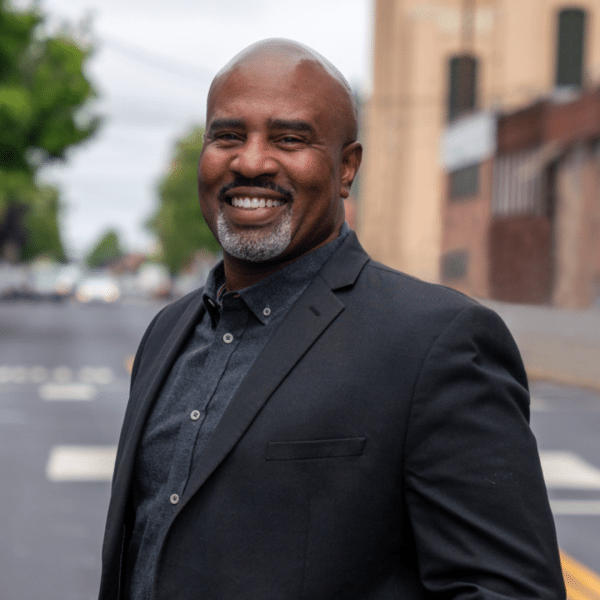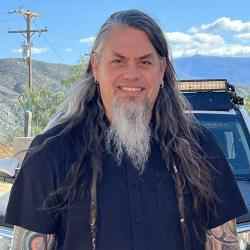Introduction
Keith Wattley is reforming the discretionary parole system which, despite its mandate, overwhelmingly fails to create pathways home for people serving long (and life) sentences who no longer pose a danger to society.
The New Idea
Keith Wattley founded UnCommon Law as the country’s first organization to explicitly target the discretionary parole process as the most overlooked contributor to mass incarceration. Hundreds of thousands of people incarcerated in America’s prisons are serving life sentences. While most of those sentences carry the possibility of parole, the actual likelihood of release is quite limited. Prison culture, particularly at the highest security levels, imposes a barrier to the vulnerability, self-reflection and resolution of past trauma required of parole candidates hoping to be released. At the same time, fear mongering rhetoric and a general aversion to risk fuel conscious and unconscious biases that infect the discretionary (or “selective”) parole process so that risk predictions about future violence are based more on stereotypes and gut instinct rather than legitimate individualized threat assessments. As a result, tens of thousands of people who committed crimes in their youth – or as children - are growing older and older in prison, locked into their histories forever.
UnCommon Law is at the forefront of a growing movement in California (which has the country’s largest prison population, and largest population serving life sentences) to reimagine how and by whom parole decisions are made. The organization spearheads the California Alliance for Parole Reform, a coalition of citizen groups, legal and human rights associations, universities and other advocates with a focus on the outsized role discretionary – or selective - parole plays in maintaining mass incarceration. Their work is informing lawmakers and legislation to build a body of evidence to reshape parole from the ground up. The team at UnCommon Law has also designed a unique, trauma-informed approach to legal services that both prepares individuals to navigate the parole process successfully and to reintegrate more effectively into society after decades away. The organization seeks to change societal responses to violence and harm more broadly by deepening our collective understanding of what causes crime - particularly the central role of childhood trauma. This also makes the organization stand out: while most recent justice reform efforts have focused on providing relief to people convicted of violent crimes, Keith and his team address head on the causes and consequences of violence because they know it’s the only way to make a dent in mass incarceration. But that starts with making decisions system-side rooted in safety and healing, not stigma.
UnCommon Law was built around the idea that most people are capable of causing harm under the wrong circumstances, and capable of healing under the right ones. Even though 80-90 percent of people in prison experienced trauma or violence as children, prisons provide little to no trauma-informed law, counseling and mental health support. In addition to their direct legal services and policy work, UnCommon Law is training people within prisons to support each other in preparing for the parole process via the Home After Harm initiative, with a focus on establishing therapeutic, supportive peer-led communities on maximum security yards.
UnCommon Law is already getting traction across the California State Prison system, where a third of the entire prison population is serving life sentences. Their work was recently cited by the California Legislative Analyst’s Office as a model for promoting more equitable outcomes in the parole process. Of the more than 300 clients that have returned home with UnCommon Law’s help, fewer than 1% have returned to prison.
The Problem
There are over 200,000 people serving life behind bars for serious or violent crimes in the United States – or one out of every seven people in prison. In California, that number is 1 in 3. The vast majority are Black or Brown, and nearly all experienced significant trauma or violence long before harming others. In short, the people with the least access to resources for responding to childhood and adolescent trauma – particularly Black, Brown, and low wealth people – are those most likely to receive a carceral response instead of a healing one.
The impact of this problem has been the continued incarceration and dehumanization of nearly a quarter of a million people across our nation, along with emotional and economic devastation for their families and communities. An additional impact is the continued redirection of valuable resources away from community efforts that heal and toward carceral efforts that harm.
By their very nature, life sentences do not account for a person’s ability to change and to develop healthy attitudes and behaviors when given the right resources. Instead, those who have received these sentences are condemned to remain in prison long after they present any risk of violence. While incarcerated, they are provided very few, if any, opportunities for healing and transformation – support that is too often seen as “coddling” bad people. For nearly 35,000 people sentenced to life in California (roughly a third of the state’s entire prison population), a process known as selective or “discretionary parole” is the sole pathway out of prison; however, the likelihood of receiving a parole grant varies drastically on the basis of race, gender, cognitive ability, and other identity characteristics that bear no correlation to violence risk. For example: all other things being equal, including the severity of the original crime, a non-Black person is three times more likely to be granted parole than a Black person. The parole board denies release to those they perceive as different, not those who are dangerous. Each year, only a small fraction of candidates are granted parole (14 percent in 2021); the majority remain and grow old in the state’s overcrowded prisons.
Far too few justice reform efforts even include people sentenced to life in prison for serious and violent crimes, which reflects a critical weakness in our nation’s current approach to criminal justice. Over the past decade, public support has grown for reforms that address some of the harms of our nation’s wars on drugs and crime. Ensuing legislation, however, has focused primarily on front end measures like sentencing reform, including some relief to people convicted of nonviolent offenses. The most advertised advocacy efforts related to life sentencing highlight wrongful convictions of innocent people, or they emphasize the life imprisonment of people convicted of nonviolent drug offenses. These approaches serve to perpetuate longstanding false dichotomies between those who are deserving of empathy and grace, and those who are not. Indeed, even with crime rates at historic lows, there is growing clamor for a return to “law-and-order” in response to increased public anxiety from highly publicized instances of violent crime. This has produced even more reluctance among lawmakers to promote legislation that would provide relief to this misunderstood population.
There are examples where the discovery of shared interests has moved policy makers in a different direction. For instance, the public’s evolving perception of opioid addiction as a mental health condition to be treated, rather than simply criminal activity to be punished, coincided with the realization that the disorder does not fit squarely into an “us versus them” dynamic to fuel public policy discussions and decisions. Recognition by whites that substance use disorders transcend race caused them to reimagine official responses to them. However, the same has not happened for other activities labeled and punished as criminal, in part due to remaining ignorance or apathy regarding the root causes and commonality of the conditions leading to crime, particularly violent crime. Our systems and cultural focus on individual responsibility and redemption effectively ignores the fact that violence in America is as much a complex social phenomenon of deprivation as it is an issue of individual defect.
The Strategy
UnCommon Law is focused on three complementary strategies to upend the selective parole process and ultimately start to shift our societal responses to violence. The first involves direct legal representation: providing trauma-informed legal support and counseling for incarcerated people who have an opportunity for parole, with the goal of making such support the norm across all prisons. The second involves reforming the parole process itself, including via strategic litigation in coalition with statewide organizations. The third focuses on narrative and mindset shift as it relates to people convicted of serious and violent crimes, with the goal of dispelling problematic myths about the causes of violence and about people’s worthiness for forgiveness and a second chance.
Like so many effective social entrepreneurs, Keith’s work began by spotting a pattern and an unmet need. In his capacity as a lawyer, he had regular contact with people serving life sentences, many of whom had the possibility of parole. What Keith quickly came to realize – and what is now backed up by evidence – is that the vast majority experienced violence and trauma as young people. That proximity to violence was often a factor in their own violent acts. And yet at no time in their lives, certainly not while incarcerated, did they have an opportunity to acknowledge and process these experiences, nor the connection to their choices and life trajectory. Survival in prisons, in fact, required compartmentalizing all of that in a black box and projecting a wholly different image: one of toughness and imperviousness.
Here’s the Catch-22: parole requires authentic reflection and remorse, and yet the culture of prisons discourages any such thing. Beginning almost 20 years ago, Keith began to work directly with clients to prepare them for parole and the opportunity to return home. Today, UnCommon Law continues this practice with clients across the state, usually beginning 6-8 months before parole hearings. As the practice has grown (the only of its kind in California), lawyers, counselors, mental health specialists and others spend dedicated time with clients, beginning with a focus on what Keith calls the ‘why’ questions. Why did they develop the patterns they did in their childhoods? What contributed to their actions? What character traits did they bring to those moments? The idea is to develop comfort and practice discussing the worst thing they’ve ever done, as well as traumatic childhood events. Keith likens it to learning a new language that is not only critical for parole, but also for life after prison.
UnCommon Law also seeks to embed trauma-informed support within prisons through the development of their “Home After Harm” program, now in its third year of a State-funded pilot. The program is aimed at creating therapeutic communities “at the yard level” in which participants serving long sentences for serious and violent offenses will have the opportunity to revisit their traumatic histories, develop new self-understanding, be accountable, and adopt coping skills. The curriculum is both informed by and delivered by formerly incarcerated individuals themselves, who are the most effective and credible messengers for this type of work. UnCommon Law has a proven track record of impact in their partnerships with people in prison; for example, one former client created a template called a “relapse prevention plan” to help himself and then others navigate the challenges of re-entry, from relationships and employment to substance abuse. It has become so widely popular that one parole board requested it as a model for all seeking parole. In time, UnCommon Law believes that work currently done by lawyers and social workers can be fully led by people in or recently released from prison – a big step toward making the organization’s trauma-informed model available to anyone in California prisons eligible for parole, and a signal that prisons are beginning to make room for healing and harm repair. Keith and his team are also taking deliberate steps to include prison officials and parole officials in their work, so that system actors can begin to see that trauma-informed support benefits not just incarcerated people but the entire system from top-to-bottom.
Keith will be the first to tell you: simply helping incarcerated people navigate a broken parole process doesn’t go far enough. It’s not just that people in prison have little access to what they need to prepare for parole and life after prison; it’s that the selective parole process itself is deeply flawed. Very few people understand this – one of the reasons Keith calls it the “most overlooked contributor to mass incarceration.” The problems with selective parole boards are many. In California, they begin with the fact that parole commissioners are Governor-appointed, meaning they are politically implicated and must keep the Governor’s favor in order to be reappointed. Many other states have Governor-appointed parole boards, but in California, the Governor also has the ability to review and reverse parole decisions, injecting an additional layer of politics into the process. The result is a natural inclination toward the least politically vulnerable path of least resistance: denying parole. (Keith tells a story of a parole board member who accidentally left a phone unmuted and shared with a colleague ‘I look forward to when we can grant parole.’ The member was shortly thereafter forced to resign.) Most parole commissioners are former law enforcement. The criteria they use to grant or deny parole is opaque and often rooted in misunderstanding or stigma, not in what will keep communities safe, and boards tend to focus on the original crime – even 30+ years after the fact – and not on the person in front of them.
So what does UnCommon Law do? They’ve spearheaded the California Alliance for Parole Reform to facilitate broad, structural change to the selective parole process in coalition with other California organizations, from the Ella Baker Center for Human Rights to Californians for Safety and Justice. Together, the coalition is working to build public support for a major policy change effort that would significantly limit the California parole board’s discretion and enforce the presumption of parole. Their focus includes:
- Establishing a more transparent, data-informed criteria for parole to eliminate or significantly curtail the parole board’s ability to arbitrarily deny parole to the mostly Black, Brown and low-wealth people serving life sentences
- Passing legislation to improve the quality of legal representation for parole candidates, increase access to trauma-informed parole preparation resources, establish greater transparency in the process, create more accessibility for people with key barriers, and enforce greater protections of due process rights
- Pursuing targeted litigation to hold the parole board accountable and shift policy, all while drawing more public attention to this issue
- Obtaining comprehensive data on historical parole outcomes and decision-making data in California via Public Records Act Requests (supplemented by litigation as needed), with the added goal of providing technical support to other states seeking to obtain similar data
- Partnering with a broad spectrum of community organizations and research partners to adapt existing research for an updated examination of parole release nationally and establish a set of progressive parole reform recommendations that could be specifically adopted in California and provide a model for other states
- Building the field of practice and a future pipeline of legal changemakers, including via the Post-Conviction Advocacy Clinic at Berkeley Law, a project that is training future lawyers to specialize in this body of work and legal principles
Finally, UnCommon Law is fostering a national public conversation about alternative responses to violence, including fair pathways out of prison for those who have harmed others. The biggest obstacle to this work is a lack of political will to meaningfully interrogate the fundamental contributors to violence, or to explore alternative responses, particularly in light of current public sentiment and reporting around violent crime. Keith and his team have published major media pieces (including in the New York Times) on selective parole and life sentencing with the aim of establishing parole as the racial justice issue that it is. Their ongoing media work includes leveraging data that demonstrates racially biased decision making and outcomes, and centering stories from formerly life-sentenced clients, many of whom return home with a deep inclination to serve others. To this end, UnCommon Law is also creating opportunities for lawmakers and other key stakeholders to spend time inside prisons, learn about the parole process, and witness firsthand what is possible what you respond to the needs of those who have committed violent crimes.
The more people understand why people commit violent crimes in the first place – including for example childhood trauma and proximity to violence – and the more they see that transformation is possible, the more likely that the false cultural distinction between an “us” and a “them” that has allowed America’s justice system to systematically dehumanize and disappear millions will start to dissolve. As this mindset shift takes place, people’s ideas about what others “deserve” start to shift, fueling demand for reforming (and perhaps even eliminating) life sentences and providing people with the support and pathways to get home.
UnCommon Law’s current budget is $4.1 Million. For the first decade or so, the budget was never more than half a million dollars, and Keith did most of the client-facing work himself. Then in 2019 the organization pivoted toward a clearer systems-change strategy. Since then, they have grown from a staff of four to a staff of 25. In that time, the organization has transitioned from a grassroots-funded organization to one with substantial foundation support, government funding, and a growing pool of individual donors giving at high levels.
The Person
From as early as he could remember, Keith wanted to be a lawyer. Even though none of the characters on the Perry Mason reruns looked like him, he was drawn to the approach of telling the story behind the story for clients. In high school, Keith took his first psychology class, and describes becoming “obsessed” with the question: Why do people do what they do? As it turns out, many years later he would find himself practicing law while asking that very question as he visited clients in prison.
Keith grew up the youngest of seven children, his oldest sister 15 years older than he is. Even in his earliest memories, he didn’t recall living in the same house with her. She was separated from the family, living on her own, on the streets or in jail. They’d all grown up with a single mother who worked multiple jobs to make ends meet, but she was the only one who fell so deeply into troubled circumstances that involved addiction and incarceration. Keith never understood until much later why she had chosen such a different life from the rest of her siblings: she had internalized blame for a traumatic accident that claimed the life of her little brother many years before.
When Keith first started working with people serving life sentences, he noticed an unmistakable pattern: many of the causes of their most harmful decisions and actions in life had roots in some unresolved childhood trauma. As he reflected on his sister’s experiences, he realized that he’d become the counselor to others that she never had. Together they came to understand how her own unacknowledged and unresolved trauma led her to believe stories about herself that justified her isolation and alienation from the family from a very young age. Like so many other people Keith had encountered, the lack of safe, healthy interventions when his sister needed them the most was an obvious contributor to the unhealthy decisions she later made.
Although his sister was never involved in violent crime, Keith saw among his life-sentenced clients the exact same feelings of rejection, abandonment, self-loathing, and shame. Recognizing just how consistently these and similar emotions show up among people convicted for violence and those convicted for nonviolent offenses alike made it very clear to him that distinguishing violent from nonviolent is an unhelpful distraction from addressing the real systemic and environmental factors creating those dangerous conditions.
Despite being a self-described introvert, Keith’s entrepreneurial instincts are clear: after just a handful of years as a young lawyer at the Prison Law Office, he took the leap to found UnCommon Law because he saw a gap in the field that no one else was filling. As the work has evolved, so too has his entrepreneurial strategy: founding Home After Harm in 2020, and more recently the California Alliance for Parole Reform as a collaborative vehicle for statewide reform.




